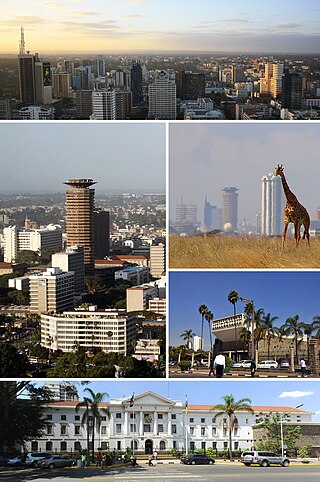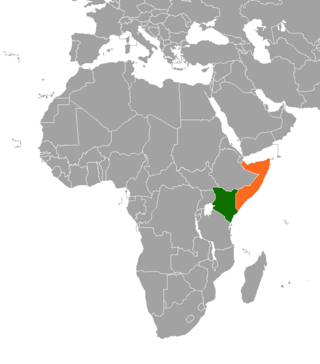| 2019 Nairobi Latema road blast Wambui Anastacia | |
|---|---|
| Location | Latema road, Nairobi, Kenya |
| Coordinates | -1.283255, 36.824728 |
| Date | 26 January 2019 |
| Weapon | Improvised explosive device |
| Injured | 2 |
| Perpetrators | Al-Shabaab (suspected) |
The Latema road blast was a minor terror incident that occurred on 26 January 2019 on Latema road in Nairobi's Central Business District. [1] The attack occurred after luggage containing an improvised explosive device detonated while it was being carried on a mkokoteni cart, injuring two people. [2]
Kenya has suffered several terrorist attacks, the most recent being the Nairobi Dusitd2 complex attack. The main perpetrators behind the attacks have been Al-Shabaab militants who have been trying to overthrow the Kenyan backed Somali government.
On the evening of 26 January 2019, at around 7 p.m., a middle aged cart pusher was approached by a man of Somali descent to ferry goods, including a box, from the Baba Dogo bus stop to the Kenya Cinema bus stop. [2] As they were nearing the junction of Latema road and Tom Mboya road, the client pretended to have forgotten his ID in a nearby MPESA agent and rushed off, leaving the cart puller waiting. [1] Shortly after he left, the goods being ferried exploded, injuring the cart pusher and a vendor. [1]
After the incident, anti-bomb squad and anti terror police units sealed off the area after evacuating the injured and searched for the owner of the goods. [3] [4] On the morning of 27 January 2019, the National police service advised members of the public to be vigilant and report any suspicious cases to the police. [5]

Nairobi is the capital and largest city of Kenya. The name is derived from the Maasai phrase Enkare Nairobi, which translates to "place of cool waters", a reference to the Nairobi River which flows through the city. The city proper had a population of 4,397,073 in the 2019 census, while the metropolitan area has a projected population in 2022 of 10.8 million. The city is commonly referred to as The Green City in the Sun.

The 2002 Mombasa attacks was a two-pronged terrorist attack on 28 November 2002 in Mombasa, Kenya against an Israeli-owned hotel and a plane belonging to Arkia Airlines. An all-terrain vehicle crashed through a barrier outside the Paradise Hotel and blew up, killing 13 and injuring 80. At the same time, attackers fired two surface-to-air missiles at an Israeli charter plane. The Paradise Hotel was the only Israeli-owned hotel in the Mombasa area. The attacks were believed to be orchestrated by al-Qaeda operatives in Somalia in an attempt to disrupt the Israeli tourist industry on the African continent. Much speculation has occurred as to who the perpetrators are, but no complete list of suspects has been defined. The attack was the second al-Qaeda terrorist operation in Kenya, following the bombing of the U.S. embassy in Nairobi in 1998. Following the attack, the UN Security Council and other nations condemned the bombing.

The African Union Mission in Somalia (AMISOM) was a regional peacekeeping mission operated by the African Union with the approval of the United Nations Security Council. It was mandated to support transitional governmental structures, implement a national security plan, train the Somali security forces, and to assist in creating a secure environment for the delivery of humanitarian aid. As part of its duties, AMISOM supported the Federal Government of Somalia's forces in their battle against Al-Shabaab militants.
From late 2011 to 2014, Kenya experienced an upsurge in violent terrorist attacks. Kenyan government officials asserted that many of the murders and blasts were carried out by al-Shabaab in retaliation for Operation Linda Nchi, a coordinated military mission between the Somalian military and Kenyan military that began in October 2011, when troops from Kenya crossed the border into the conflict zones of southern Somalia. According to Kenyan security experts, the bulk of the attacks were increasingly carried out by radicalized Kenyan youth who were hired for the purpose. Kenya security officials also indicated that they were part of death squads, which carried out many of the killings under the orders of a government security council. By mid-2014, the cumulative attacks began affecting Kenya's tourism industry, as Western nations issued travel warnings to their citizens.

Many terrorist attacks have occurred in Kenya during the 20th and 21st centuries. In 1980, the Jewish-owned Norfolk hotel was attacked by the Palestine Liberation Organization (PLO). In 1998, the US embassy was bombed in Nairobi, as was the Israeli-owned Paradise hotel in 2002 in Mombasa. In 2013, the Somali jihadist group al-Shabaab killed 67 people at Nairobi's Westgate Shopping Mall. There have also been many other attacks.

The Somali–Kenyan conflict has been an issue within Kenya since the colonial period. Problems have ranged from skirmishes between the two communities and have led to terrorist attacks, police harassment, extortion, home invasions, physical violence, and massacres perpetrated against Somalis and Kenyans.

On 21 September 2013, four masked gunmen attacked the Westgate shopping mall, an upscale mall in Nairobi, Kenya. There are conflicting reports about the number killed in the attack, since part of the mall collapsed due to a fire that started during the siege. The attack resulted in 71 total deaths, including 62 civilians, five Kenyan soldiers, and all four gunmen. Approximately 200 people were wounded in the massacre.
On 4 May 2014, two improvised explosive devices exploded on buses in Nairobi, Kenya, killing three people and injuring sixty-two. Both of the bombs exploded northeast of Nairobi on the Thika Road, an eight-lane controlled-access highway, and detonated 1 kilometre (0.62 mi) apart. Twenty of the wounded were in critical condition after the blast.
On May 16, 2014, two improvised explosive devices were detonated simultaneously in the Gikomba market in Nairobi, Kenya, killing at least 12 people and injuring 70. The first blast came from a minibus and the second from within the market. Two people were reportedly arrested at the site of the explosions. Shortly after the attacks, hundreds of people swarmed onto the crime scene despite police efforts to stop them.
On 2 April 2015, gunmen stormed the Garissa University College in Garissa, Kenya, killing 148 people, and injuring 79 or more. The militant group and Al-Qaeda spinoff Al-Shabaab, which the gunmen claimed to be from, took responsibility for the attack. The gunmen took over 700 students hostage, freeing Muslims and killing those who identified as Christians. The siege ended the same day, when all four of the attackers were killed. Five men were later arrested in connection with the attack, and a bounty was placed for the arrest of a suspected organizer.
The IS insurgency in Tunisia refers to the ongoing militant and terror activity of the Islamic State branch in Tunisia. The activity of the Islamic State (IS) in Tunisia began in June 2015, with the Sousse attacks, though an earlier terror incident in Bardo Museum in March 2015 was claimed by ISIL, while the Tunisian government blamed Okba Ibn Nafaa Brigade for the attack. Following massive border clashes near Ben Guerdane in March 2016, the activity of the IS group was described as an armed insurgency, switching from previous tactics of sporadic suicide attacks to attempts to gain territorial control.
Operation Radd-ul-Fasaad is a codename of a combined military operation by the Pakistani military in support of local law enforcement agencies to disarm and eliminate the terrorist sleeper cells across all states of Pakistan, started on 22 February 2017. The operation is aimed to eliminate the threat of terrorism, and consolidating the gains of Operation Zarb-e-Azb which was launched in 2014 as a joint military offensive. It is further aimed at ensuring the security of Pakistan's borders. The operation is ongoing active participation from Pakistan Army, Pakistan Air Force, Pakistan Navy, Pakistan Police and other Warfare and Civil Armed Forces managed under the Government of Pakistan. More than 375,000 operations have been carried out against terrorists so far. This Operation has been mostly acknowledged after Operation Zarb e Azb.
This article is a chronological outline of terrorist incidents in Pakistan in 2018.
Events of 2019 in Kenya.

The 2019 DusitD2 complex attack was a terrorist attack that occurred from 15 to 16 January 2019 in the Westlands area of Nairobi, Kenya, which left 22 civilians and all five terrorists dead.

On 6 December 2019, at least 11 people, including seven police officers, were shot dead on or outside a bus in Kenya. The Medina Bus Company vehicle and its passengers were attacked on a road in a rural area between Wajir and Mandera in northeastern Kenya. Al-Shabaab claimed responsibility for the attack.
This is a 2019 timeline of events in the Somali Civil War (2009–present).